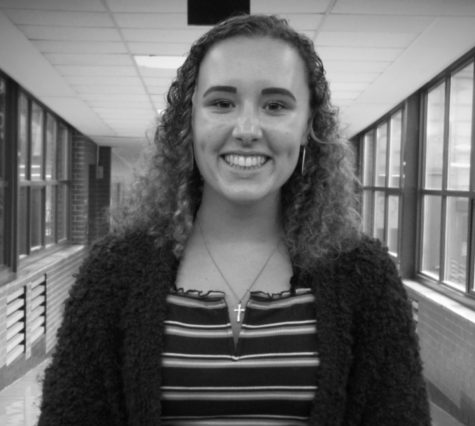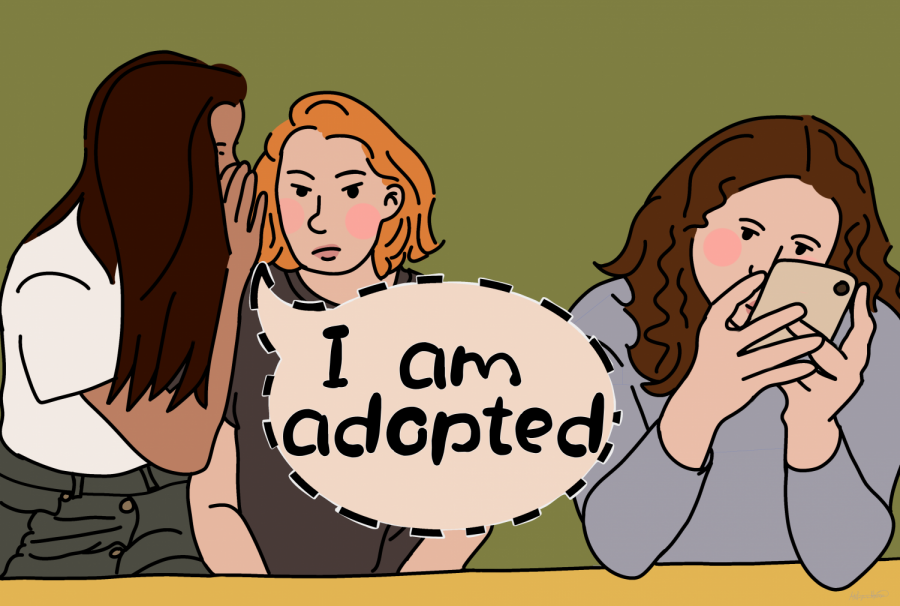Adoption: Fact vs. Fiction
Aside from opening up about my own story of adoption, I also delve into the psychology of adoption
People should be able to talk about adoption but instead everyone wants to be quiet about it.
A little girl was born in a downtown hospital on December 26, 2003. She had about two days with her birth mother before she was handed over to the social worker. To this day, she is still not sure how her whole story was unfolded.
She knows that her adoption case was closed, which means her birth parents don’t know her adoptive parents and vise versa.
It all started at a family gathering of some sort. She was about seven years old when she found out from her adoptive cousin that she was adopted. She and her cousin were talking, and then it all just happened- like the words being said weren’t important to him. She was devastated, and it felt like the room around her started to cave in. She was being exposed. She no longer felt as though she fit in. The voices of her other cousins sitting around seemed to be saying, “You didn’t know?” “How didn’t she know?”. Her head was spinning. She wasn’t quite sure what adoption meant and how much it affected her life. She was so young.
Her life would never be the same. Adoption would be something she struggled with for the rest of her life. Her name was Madyson.
Adoption is a very meaningful subject. It touches my heart in very emotional ways. It has reshaped my viewpoints, my morals, and my life. Adoption is also a controversial topic, which is understandable. Maybe that’s another reason no one wants to talk about it, because it brings up an even more intense discussion.
Suddenly we go from adoption to even bigger-more dramatic topics. But knowing the basics can make an impact in the long run for whatever side you stand on. It is crucial to be open and respectful to the fact that people around you may have lived through adoption, and that it has affected their lives in a number of ways.
Remember those family tree projects where we had to trace back our history and talk about our great-great-great grandparents? I never enjoyed those. Don’t get me wrong, it was intriguing to learn about everyone’s family history and hear about everyone’s story. But it wasn’t my story. It wasn’t my birth family. Family trees made me truly think about things in my life that I just wanted to push away and hide- like I was hiding from myself and from my past.
Adoption. One word. One word that can make a huge difference in some people’s lives. One word that can drive a wall through people’s viewpoints. Adoption is a scary process but make no doubt about it, there are ways for it to be comforting. Adoption provides a life to a child whose birth parents could not raise them. Yes, there are some cases where it can be a scary process, but it does not have to be.
The movies, for example, dramatize the whole adoption process. Producers exaggerate the whole situation and give a negative connotation to adoption- possibly another reason it seems scary to people.
Gabbi Hundley, a student from Grove City College, is adopted, and she has voiced her story to me. She told me she believes, “that movies are dramatic. It’s a long process to actually get a child and the movies don’t show that process. They make it look easy”. By the movies showing people how “easy” adoption is over and over, many are going to start to believe it.
Take away all the opinions and ideas you have about adoption. Let’s start at the beginning. What are we left with?
The word adoption. What does it mean? By definition it means, “the action or fact of legally taking another’s child and bringing it up as one’s own, or the fact of being adopted”.
To someone who is adopted, that definition could be scary. “Legally taking one’s child”. This is the image presented to show the world what adoption is. That is factually correct but there is so much more behind just the legal side of adoption.
There is the emotional side that the adoptees feel. Adoptees that are even closer to you than you think-in the same school even and Pittsburgh area. Gillian Porter, a 10th grade student from Mars Area High School, has lived through adoption. She says, “It’s a normal thing and I don’t know anything else. I’m used to it”. To Gabbi Hundley, adoption means, “You have two families. You have your biological family and family that has you now- your adoptive family”.
And then there are different perspectives, from people who aren’t adopted for instance. Quinn Volpe, a sophomore from NAI, has positive ideas about adoption. She also explains, “It is important for people to adopt locally, because there are a lot of kids in America’s foster care system and even some who age out of the system. I can understand why that might be difficult, though, because the process of adoption here can be complicated”.
The adoption rates have declined in the past decade. The National Council For Adoption has written an article called, “Adoption: By the Numbers” authored by Jo Jones, PH.D., and Paul Placek, PH.D. “Adoption: By the Numbers” talks about the statistics of adoption starting with Drs. Jones and Placek reporting, “the total number of all adoptions taking place in the U.S. has fallen, from a count of 133,737 adoptions in 2007 to 110,373 in 2014”.
There are two different types of adoption: Domestic adoption refers to the babies born and adopted in their home country. These babies are put up for adoption by their birth parents who legally consent to the adoption. International adoption refers to babies being adopted outside of their home country by adoptive parents of a different country.
There are also two other types of adoption: Closed and Open adoptions. Closed adoption means there is no contact between the birth parents and child. Open adoption means that there can be contact between the child and birth parents.
There are pros and cons to both. Closed adoptions can always leave the child wondering about their family and that can be devastating in some cases. But with open adoptions, the child has access to their medical files and can have contact with their birth parents.
Either way, adoption is no simple process. Many people believe that adoption is an “easy” process, whether it be domestic or international. In reality, adoption is never a simple topic. On the personal side, it is something that has been hard for me to grasp. That is still my biggest struggle- to be able to understand why this happened to me and why my birth parents are not in my life.
“Resolve: The National Infertility Association”, is busting myths about adoptions. According to “Resolve”, “International adoption is even easier than domestic adoption”. No adoption is easy. Not only does it affect the adoptive parents emotionally and financially, it affects the child on an even bigger emotional level. International adoptions can also affect the child because of cultural differences.
Pew Research Center says, “The number of children from outside the U.S. adopted by Americans continued its steady decline in 2016 according to data from the US Department of State”. The article continues on and says, “All five countries (China, Russia, Guatemala, South Korea, and Ethiopia) have revised their adoption protocols in recent years, making it more difficult for Americans to adopt from these countries”.
All adoption stories are different. There are many reasons why birth mothers choose to adopt. Sure, some birth mothers could be teenagers but stated by “American Adoptions News”, another myth is that “Most Birth Mothers are Teenagers”. This section states, “While some prospective birth mothers are teenagers, the majority of pregnant women considering adoption are actually about 25–35 years old, and many are raising older children”.
Birth mothers want to give their child the best life they can, even if that results in them not being in their life. The big picture of adoption is simply giving the child a life they deserve. “Adoption: By the Numbers”, states, “Research has shown the benefits of adoption for children who need families, as it provides the safety, security, and developmental support that only permanency within a nurturing family can”.
On a more personal level, I’ve had a hard time coming to the conclusion that my birth mother did everything she could to give me the life I have now, even though she is not a part of it. Closure from her is always something I’ve struggled with- especially because I had a closed adoption case which also means it is extremely difficult to find my birth parents. But I’ve had to come to terms with the fact that adoption was not giving up for my birth mother.
She ultimately gave me this amazing life I have now. And giving a baby up for adoption is not giving up either. It’s humbling the parent and saying that someone else can give this child a better life than the birth family can.
Adoption is something people should be able to talk about but it can be an uneasy subject for some people especially if it means something different to everyone. Not only can adoption be controversial but it can also be difficult to understand and comprehend.
Even though, for some people, it is hard to cope with, we can still help each other and believe there is hope left in this world. Just like Mike Lepley once said, “The best is yet to come so stress less and love more”.
Adoption is not the end. In fact, it’s only the beginning.

Madyson Cieszynski is a sophomore and this is her first year on the NAEye staff. She is a member of Key Club and the choir. Outside of school, she has...

AshLynn Harrison is a student at North Allegheny Intermediate High School. Her therapist has said, to her face, that she has no life.
AshLynn does have...




Shirley Baney • Oct 5, 2019 at 11:54 am
This was written from the heart, & read from the heart. I am touched beyond words. My situation is kind of the opposite. I was told I was adopt when I was 12. And the story goes on into adulthood when my birth mother passed on, I thought that was the end of my story. Then as I go through important papers & come across a letter from an attorney from when I was 17 explaining that I was not in fact adooted, only had a name change! Now I struggle with the “why” of it all with no one left to ask.
God bless your parents & you, my dear, for giving me the chance to write this. My best to you all!
Eric Robert Crownover • Oct 4, 2019 at 9:14 pm
Madyson is cool